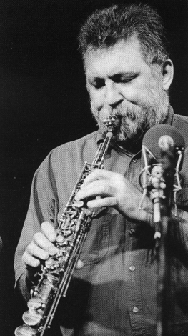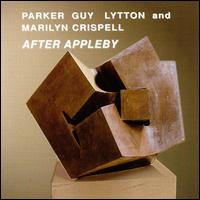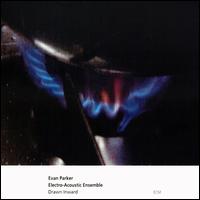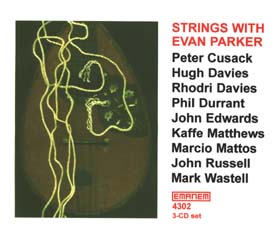
A
FIRESIDE CHAT WITH EVAN PARKER
I
could be wrong here and it wouldn't be the first time, but I think I've
only read less than a handful of Evan Parker interviews. That seems almost
comical that an improviser of Parker's level would not be featured more
in the jazz periodicals. But shedding light on artists like Parker, Maneri,
McPhee, Vandermark, Dixon, and Bley is why I still get up in the morning
and do this since I don't make a dime. So I am honored to present to you,
one of the finest players on either side of the Atlantic, Evan Parker,
unedited and in his own words.
FRED JUNG: Let's start from the beginning.
EVAN PARKER: My very earliest attempts were to sound like Paul Desmond.
I used to play alto when I started. That was my first model was Paul Desmond.
It seems a bit strange in the way things have developed since then, but
that's how it is. I switched to soprano and tenor later and was trying
has hard as possible to play like Coltrane and then things seemed to take
course on their own some time later.
FJ: How prevalent was Coltrane's influence on your music?
EVAN PARKER: Well, I think that influence is still alive and still working
in so many players at different levels and some people are looking to
emulate the actual sound of Coltrane or his phrasing or his particular
harmonic approach in different periods and other people are taking just
more general inspiration from the seriousness of his approach to music
and his dedication to the instrument. So there are many ways in which
his influence is still alive and the music itself is still incredibly
alive when you listen to it. In the end, that was the kind of life-changing
influence, because in the end, that is what made me think that I would
try to be a saxophone player and see where it led.
FJ: Do you have a favorite Coltrane piece?
EVAN PARKER: I always especially loved to listen to the record called
The John Quartet Plays (Impulse!) and then it has just got the four tunes
they play, "Chim Chim Cheree" and "Brazilia." That record, I think, is
amazing. So many others are amazing as well, the whole span of the man's
work, which is the biggest impact of all.
FJ: Let's touch on your work with the Spontaneous Music Ensemble.
EVAN PARKER: Well, that was really a group which began with clearly a
connection with the jazz tradition, playing material that was either Ornette
Coleman influenced or Eric Dolphy influenced or George Russell influenced,
depending on who had done the writing, but then something happened there
again, some strange switch of some button in people's heads and we started
to play without written material. That was quite soon after I had joined
the group actually. That period where John Stevens and I were working
as a duo was really very important to me and was really the first experiences
I had of playing totally free. Everything else in my life is built from
that starting point. I can't overestimate the importance of that relationship
with that group. I met so many important musicians, Kenny Wheeler, Dave
Holland, Derek Bailey, Paul Rutherford, apart from the very strong influence
and guidance from John Stevens himself. There were so many good players
that were somehow connected with the group at different stages of its
development.
FJ: Playing free, although the connotations are that it always for an
infinite amount of freedom, it also brings with it a tremendous amount
of pressure, having to sustain ideas for lengthy periods of time.
EVAN PARKER: Well, yeah, John Stevens was a very contradictory figure
in that he wanted you to be free, but he wanted you to be free in a particular
way or style depending on which kinds of problems he was working on at
any one stage. So the sound of that group changes quite a bit from period
to period over the years of its existence, depending on the things which
John was curious to explore at any one point. Yeah, Fred, freedom is one
of those strange words. You're free from something. You're free to do
something. It's only a kind of nickname in the end for the music. It doesn't
really tell you about how it works or how things develop, how things evolve
because they do. It's not as if there is one place which is like the nirvana
of freedom and once you've reached that, you have it. It is sort of a
state of constant development and evolution and it's the freedom to do
and to be in that state as much as the freedom from the constraints of
any particular method.
FJ: With that being the case, then how does an artist, who is playing
free, know when the conclusion of a piece is?
EVAN PARKER: (Laughing) Well, that can be a problem, but groups where
that is a problem don't stay together for too long because that is one
of the key understandings that have to be arrived at is that sense of
overall form. It's completely intuitive. With some combinations you have
it and you have it very clearly and with other combinations you have a
kind of friction, especially decisions about how pieces should be shaped.
They are crucial questions that can be fought over if in effect in the
music. I like to work with people that have the same sense of form and
development that I do.
FJ: One of those intuitive persons is Derek Bailey, with whom you formed
the Music Improvisation Company.
EVAN PARKER: Yes, yeah, that was a kind of co-op group that we had a long
time ago that didn't fluctuate in personnel very much. It started as a
rehearsal trio. I don't think we ever played as a trio in public. We just
rehearsed and talked about what the group needed and then we asked Hugh
Davies to join, who was coming from a background as a student of electronic
music and composition and a builder of his own instruments, which in those
days was less common than it is now. Many people have started to work
in the same field has Hugh, but in those days, he was a fairly singular
figure, putting his own instruments and developing ways of playing the
instruments in a group context. And for the first half of the group's
life, that is what it was, a quartet. And then the second half of the
group's life, we invited Christine Jeffery, who came from a fine art background,
a painting background and she was interested in vocalise as much as singing.
She did things with her voice which subsequently have also become more
normal. Unfortunately, Christine doesn't play anymore, but obviously Derek
is still very active and Hugh Davies is still very active. Jamie Muir
has retreated into painting and poetry and a kind of solitary existence
and Christine, I think, is still very much involved with Tibetan Buddhism.
FJ: You recorded two notable albums with Peter Brotzmann, Machine Gun
and Nipples.
EVAN PARKER: Yes, I think we met through Peter Kowald and a radio production
through Joe, who was a very powerful producer, especially with SudWestFunk
and programming of various festivals and so he was a very influential
character. He used to organize Christmas workshops for the freer end of
the music in those days, which was a way of making sure he had spent his
budget by the end of the year and making sure some of the more impoverished
musicians would have something for Christmas. That is where I met Brotzmann.
Don Cherry was there that same year and I think Marion Brown and in other
years I met John Tchichai, various people who were on the cusp of free
jazz into free improvisation.
FJ: What prompted you to form the Incus label?
EVAN PARKER: Well, I think it was very much in the air. There were one
or two good precedents. Sun Ra was already well known with Saturn Records.
Closer to home, Brotzmann had already started to do a couple of things,
a trio record and the Machine Gun record, which were originally on Peter's
own label. It just seemed to be the way to go. There was not much enthusiasm
coming from the major record companies. One or two musicians made efforts
to approach major companies and work with them. Tony Oxley did a couple
of things with CBS, I think Columbia, although it was called CBS in this
country. There was no real feeling for the music from corporate recording
companies. I would say, by in large, that continues to be the case. Obviously,
ECM, when they started were pretty much a musician's label. It is hard
perhaps to remember that and put that into perspective, but the origins
of ECM is the same as Incus or FMP or any of those small labels at that
time during the late Sixties, early Seventies. They have just been a hell
of a lot more successful than some of the other labels because they had
a more diverse musical policy and had one or two big selling things, which
gave them the power and the freedom to diversify even further and they've
done a fantastic job of building themselves into a worldwide presence.
Not all of the smaller labels have been able to do that, but never the
less, they've done very interesting and important work and I still like
to consider that option for certain things. I think it is the right way
to go.
FJ: Let's talk about your latest releases on the before mentioned ECM
label, Drawn Inward and Toward the Margins, both with your Electro-Acoustic
Ensemble.
EVAN PARKER: Well, the idea here was to include some of the possibilities
of live processing, which have come up with the development of computer
technology and the affordability, robustness, and transportability, all
of those factors, which twenty years ago, to do those kinds of electronic
treatments, you would have had to been in a very large studio, tied into
one place and you could not have ventured taking that kind of stuff out
on the road without massive subsidy, whereas now, that kind of stuff is
affordable and therefore, there are interesting musicians working with
that kind of stuff independently and they are not tied to any particular
institutions. They have the complete freedom as individuals to associate
with other musicians that they like and the whole ground rules of working
with electronic music have changed. I wouldn't say that I've been continuously
involved with that aspect, although with Paul Lytton and Music Improvisational
Company, there has always been some kind of element of live electronics
even before computing was part of that. Paul Lytton worked with live electronics
and so I have always been associated with people that have worked with
that kind of sound world and it is just that the advent of computer based
processing gives everybody so much more power now and makes the systems
clean. You can use multiple treatments without the buildup of noise. The
whole thing is suddenly very interesting and I have been fortunate to
work with some of these very interesting people. Lawrence Casserley is
a great find. He's really from the world of conservatory, but he's given
up teaching now and wants to perform as much as possible, so it is a very
happy coincidence that that comes at the same time as my interest of working
with that kind of ensemble. The coincidence is great. Walter Prati is
a musician that I have known for about ten years now. When we started
it was rather basic kind of stuff, but he has also evolved a system that
has become increasingly kind of sophisticated. Also, mention that George
Lewis has been a very important pioneer in the combination of computers
and improvisation, although his use of it is very different from my use
of it, but his courage and vision has been very stimulating and very important.
FJ: I am intrigued by improvisers utilizing advent of technology and electronics,
but I am in the minority.
EVAN PARKER: Improvisers are not so happy about it, Fred, but I don't
know why. I don't know why. A hundred years ago, people weren't probably
happy about the saxophone and twenty years ago, people weren't happy about
synthesizers. You can't turn the tide back. These are new instruments.
They are some great players playing with computers now. They have to be
welcomed into the music and into the community and that is my plan. If
it upsets a few people, well, I'm sorry, but I have to follow my own vision.
FJ: Let's touch on Chicago Solo (OD 12017), a release on Okka Disk (www.okkadisk.com),
where you play tenor throughout the session.
EVAN PARKER: That's right. That was at the request of Bruno and John Corbett.
They thought there were enough solo records around and so it was time
for me to try a tenor one. So in the spirit of, "OK, if you think so,
I'll try." That's how that one came out. It was a very nice studio in
Chicago. The engineer there is very good and it is a nice place to work
and they get a very good sound. It came out OK. If all those things are
in place, well, then it is a pleasure to do something.
FJ: And you largely stick with the tenor for Foxes Fox, your latest on
Emanem, Martin Davidson's label, who has been a tremendous proponent of
yours throughout the years.
EVAN PARKER: Yeah, it is the way it's been moving these days. The more
drums are there and bass, the more tenor I play. I don't know why that
is. It's a bit polarizing. The more we go to electronics, then the more
soprano I play. I have reached a fork in the path and tenor goes that
way and soprano goes that way. But I have tried to find so situations
where I can play them both. That still happens, Fred, but it is more and
more either or, in this context tenor, in this context soprano.
FJ: Monkey Puzzle on Leo, a duo record with Ned Rothenberg, whom you are
playing with at the Knitting Factory next month.
EVAN PARKER: Right, there is a whole bunch of concerts that Ned has set
up where we will be playing duos and solos. Yeah, that is another association
that goes back a long time now. When I first met Ned, he came over with
a large ensemble of Anthony Braxton I think. I met him in Germany sometime
in the early Seventies and stayed in touch. Every so often we do concerts
together and then we made the record for Leo. Now, I am looking forward
to chance to work on it in more depth.
FJ: All the tracks are titled "Forů" the names were not very familiar.
EVAN PARKER: Those are the names of crossword compilers. I mean, it was
a bit of slightly obsessive packaging. You'll notice that I'm quite interested
in the crossword puzzle, even though it is an American invention. I think,
in this particular case, the cryptic crossword puzzle, which is a development
of the basic American idea, I would say, is a significant improvement
on the basic American idea. So I wanted to try my hand at complying a
cryptic crossword puzzle and Ned said, "OK." And Leo said, "Fantastic!"
But Leo says fantastic to everything, which is what is great about Leo.
He said, "Awe, Evan, why don't you start it now." I don't think anybody
else has done a crossword puzzle for their cover and having done that
I wanted to make my admiration of some of these compliers clear by titling
the tracks for them, although, I doubt any of them will ever buy the record.
They are all anonymous and so you never know who they are. They use these
strange names.
FJ: Will you continue to feature your tenor playing more on record?
EVAN PARKER: Oh, yeah, I'm playing both instruments as equally as I have
ever played them. It is a strange thing, but I know now that sometimes
I will only play tenor or I will only play soprano. A lot of the times,
I can play both of them.
FJ: It takes time for the media and the public to catch up with an artist,
do you find that that is the case with your music as well?
EVAN PARKER: Well, I can only look at the picture of the way my musical
life has gone and every year, it has gotten a little easier than the year
before. I take that to mean, yeah, each year more people are interested.
But a part of that has to do with the accessibility and the kind of help
that you are giving now by talking to me, Fred. You bring that word to
many more people and maybe that adds more people to my audience. It is
a very patient life activity really. I don't know what the natural audience
of what I'm doing is. I have got no idea. I certainly have no fixed expectations
on that. I'm very happy that there is an audience. Whether it should be
bigger or whether it is already bigger than it should be, those are questions
for other people I think.
FJ: Is the audience getting younger?
EVAN PARKER: I think the core audience for live music is a younger audience.
I am quite encouraged by the older people that have the stamina to stay
with it (laughing). They start to feel their age and it's more of an effort.
I like to play for people who have decided to come, whatever their reasons
and try to make sense of them having come and hope they come again if
they like it.
FJ: There are vibrant avant scenes in New York, the downtown scene with
the Knitting Factory and Chicago has dedicated support from the AACM and
artists like Ken Vandermark and producers like John Corbett. Los Angeles
will be the home to a Knitting Factory in the next few months, when will
you be throwing us a bone?
EVAN PARKER: Well, I remember playing the Century City Playhouse years
ago. I did a concert with Derek and we had a fantastic audience, a very
warm audience, I remember in LA. I'd love to come there sometimes. I have
no problem with the idea at all.
FJ: That is what they all say and then I am left holding the welcome sign.
EVAN PARKER: (Laughing) Well, I think it makes sense to call it a separate
touring option and not try and do it all in one visit. I know there are
places in San Diego, LA, San Francisco, Seattle, and Oregon. They all
have had great scenes. It should be for me to let somebody know that I'd
like to come there.
Fred Jung is Editor-In-Chief and business unusual. Comments? Email
him.



